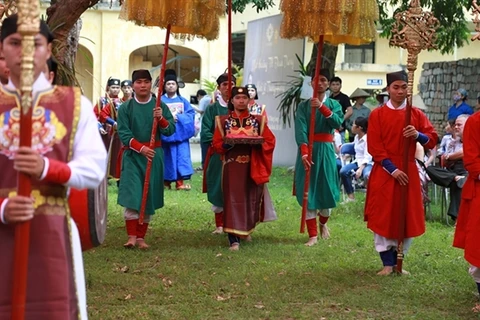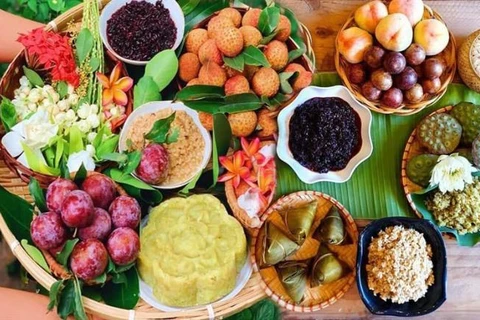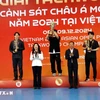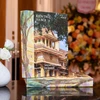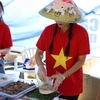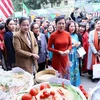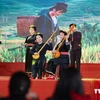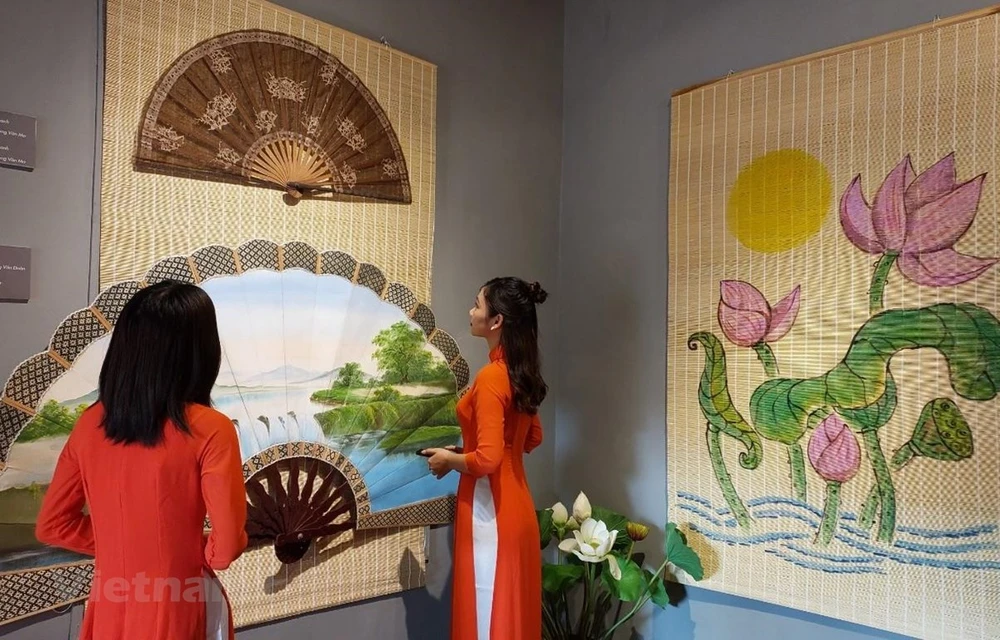
Hanoi (VNA) – The “Doan Ngo festival – Past and Present” programme was held at the Thang Long Imperial Citadel, the capital city of Hanoi on June 1.
The ancient ritual of fan gifting was enacted as part of the celebration of the Doan Ngo Festival (which take place on the fifth day of the fifth lunar month).
During the Later Le Dynasty (1533 - 1789), the reigning kings hosted a ritual to give fans to all the mandarins during the Doan Ngo Festival in summer.
With the hot weather surrounding Doan Ngo Festival, the ritual to give fans to all the mandarins showed the king's special care for the mandarins.
This year, the organising board displayed a 2.4m-sized royal fan from 1503 with a poem written by King Le Hien Tong inscribed on the fan along with the display of some replica fans for kings, queens and mandarins.
The exhibition space also introduces visitors to the unique customs of Doan Ngo Festival. On the occasion, Professor of History Le Van Lan and Culinary Artist Pham Thi Anh Tuyet discussed ancient customs and antique trays from the Doan Ngo Festival.
This year’s Doan Ngo Festival falls on June 3.
Doan Ngo Festival, commonly called “Tet giet sau bo” (pest-killing festival), on the fifth day of the fifth lunar month is one of the many traditional customs of Vietnamese people, and it falls on June 3 this year.
“Doan” means the beginning while “Ngo” is the period from 11am to 1pm. “Doan Ngo” is the time when the sun is closest to the earth.
Meanwhile, the folk name “Tet giet sau bo” comes from the old practice of catching and killing pests that harm crops.
On this day, people often cook traditional dishes to offer to ancestors and pray for bumper crops, good business, and good luck in a new season. Apart from typical fruits like lychee and plum, “ruou nep” (fermented glutinous rice) is an indispensable part of this occasion.
This festival is also celebrated in China, the Democratic People’s Republic of Korea, and the Republic of Korea. It is in fact an East Asian custom associated with the circulation of weather in a year./.
| Chang Son Village, on the outskirts of Hanoi, has produced traditional fans for centuries. As the pace of modern life gets ever more hectic, it's refreshing to see a time-honoured craft maintained by skilled and passionate villagers. Despite the cooling breeze generated by modern electric fans and air conditioners, the trade of making traditional fans in Chang Son Village has been well preserved and even thriving for centuries. Located about 30 kilometres from Hanoi, Chang Son is a typical village in northern Vietnam. Arriving at the village during the busy harvesting seasons, visitors can easily catch sight of the local farmers working industriously in the vast fields, piling up the straw while drying the golden paddy rice along the entrance roads. It is noted in local history that in the 19th century, French colonists used to bring Chang Son fans to Paris for exhibition. Additionally, villagers demonstrating excellent skills in making the fans could be nominated for the position of feudal honorary rank normally reserved for notable or rich men. Regardless of the weather, villagers are busy making fans all year round. As the paper fans are consumed in great number over the hot summer days, the festive or decorative silk fans can be in demand at any time of the year, especially in festive periods like March./. |




